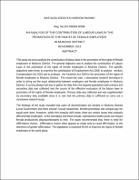| dc.contributor.author | Sseguya, Batuusa. Haroon.Rashid | |
| dc.date.accessioned | 2017-06-29T09:00:30Z | |
| dc.date.available | 2017-06-29T09:00:30Z | |
| dc.date.issued | 2013 | |
| dc.identifier.citation | Sseguya, B.H.R. (2013).An analysis of the contribution of labour laws in the promotion of the rights of female employees in Mukono district.Thesis (Masters). Islamic University in Uganda | en_US |
| dc.identifier.uri | http://hdl.handle.net/20.500.12309/286 | |
| dc.description.abstract | ABSTRACT
This study set out to analyse the contribution of labour laws in the promotion of the rights of female employees in Mukono District. The general objective was to analyse the contribution of Labour Laws in the promotion of the rights of female employees in Mukono District. The specific objectives were three; to examine the contribution of Employment Act 2006, to analyse workers Compensation Act 2001 and to evaluate the Factories Act 2000 in the promotion of the rights of female employees in Mukono District. The researcher used a descriptive research technique in order to bring out the exact relationship between employers and female employees in Mukono District. A survey design that was to gather the data from the targeted population both primary and secondary data was collected into the course of the effective evaluation of the labour laws in promotion of the rights of female employees. Primary data was collected and was supplemented by secondary data available since it is rare that the primary data is sufficient to carry out a conclusive research study.
The findings of the study revealed that cases of discrimination are evident in Mukono District Local Government and these include; sexual harassment, limited promotion and unequal pay for equal work done. However, while this inequity still exists, there are certain issues that uniquely affect female employees in the workplace and these include; reproductive health issues can impact female productivity disproportionately to men. The study recommended that, there is need for Affirmative Action. Affirmative Action often appears to relate only to racial affirmation, to the detriment of gender affirmation. The legislation is expected 95.6% to improve the rights of female employees in the work place. | en_US |
| dc.language.iso | en | en_US |
| dc.subject | Labour Laws | en_US |
| dc.subject | Rights of female employees | en_US |
| dc.subject | Female employees | en_US |
| dc.subject | Rights | en_US |
| dc.title | An analysis of the contribution of labour laws in the promotion of the rights of female employees in Mukono district. | en_US |
| dc.type | Thesis | en_US |

